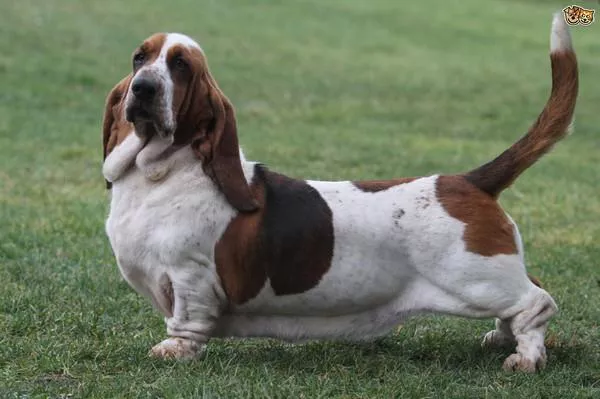Basset Hounds are a distinctive breed known for their long ears, droopy eyes, and affectionate nature. As a veterinarian with extensive knowledge about dogs, it’s important to understand what foods appeal to Basset Hounds and how to ensure they receive a balanced diet that meets their nutritional needs. This article will explore the dietary preferences of Basset Hounds, their favorite foods, and guidelines for feeding them to maintain optimal health.
Understanding Basset Hounds
Breed Characteristics
Basset Hounds are a medium-sized breed with a robust build, characterized by their long bodies, short legs, and distinctive facial features. Known for their keen sense of smell, they were originally bred for hunting small game like rabbits and hares. Their friendly and laid-back demeanor makes them excellent family pets.
Nutritional Needs
Basset Hounds have specific nutritional needs that are essential for maintaining their health and well-being:
Proteins: Essential for muscle development and repair. High-quality animal proteins like chicken, beef, and fish are important.
Fats: Provide energy and support skin and coat health. Include healthy fats like fish oil and flaxseed oil.
Carbohydrates: Source of energy and fiber. Complex carbohydrates like sweet potatoes, brown rice, and oats are beneficial.
Vitamins and Minerals: Important for overall health, immune function, and metabolic processes. Ensure a balanced intake of vitamins (A, D, E, B-complex) and minerals (calcium, phosphorus, potassium, magnesium).
Favorite Foods of Basset Hounds
High-Quality Commercial Dog Food
Dry Kibble:
Convenient and easy to store.
Look for high-quality brands with named animal proteins as the first ingredient.
Choose formulas specifically designed for medium-sized breeds.
Wet Food:
Higher moisture content, which can help with hydration.
Often more palatable to picky eaters.
Look for grain-free options with real meat and vegetables.
Homemade Meals
Cooked Meat:
Basset Hounds often love cooked chicken, beef, turkey, and lamb.
Ensure the meat is cooked thoroughly and free from bones.
Vegetables:
Many Basset Hounds enjoy vegetables like carrots, green beans, and sweet potatoes.
These can be cooked or raw, but should always be cut into manageable pieces.
Fruits:
Apples, blueberries, and bananas can be a healthy treat.
Avoid fruits with pits or seeds that can be toxic, like cherries and grapes.
Special Treats
Dog Biscuits:
Choose high-quality dog biscuits with natural ingredients.
Avoid treats with artificial colors, flavors, or preservatives.
Chews:
Basset Hounds enjoy chewing on items like rawhide, bully sticks, and dental chews.
Ensure the chews are appropriate for their size to avoid choking hazards.
Homemade Treats:
Make homemade treats using safe ingredients like peanut butter (free from xylitol), pumpkin, and oats.
These can be a fun and healthy way to reward your Basset Hound.
Feeding Guidelines
Feeding Schedule
Puppies (up to 6 months):
Feed 3-4 times a day.
Ensure the food is specifically formulated for puppies to support their growth.
Adults (6 months to 7 years):
Feed 2 times a day.
Maintain a consistent feeding schedule to regulate metabolism and digestion.
Seniors (7 years and older):
Continue feeding 2 times a day, but consider a senior-specific formula that addresses their changing nutritional needs.
Portion Control
Caloric Needs:
Follow feeding guidelines on commercial food packages, adjusting based on your dog’s activity level, age, and weight.
Regularly monitor your Basset Hound’s weight and adjust portions as needed.
Avoid Overfeeding:
Basset Hounds can be prone to obesity due to their low energy levels.
Measure food portions accurately and avoid free-feeding.
Hydration
Fresh Water:
Ensure fresh water is always available.
Basset Hounds can be prone to dehydration, so monitor their water intake.
Wet Food:
Incorporate wet food or add water to dry kibble to increase moisture intake.
Special Dietary Considerations
Allergies and Sensitivities
Common Allergens:
Identify and avoid common allergens like chicken, beef, dairy, and grains if your dog shows signs of allergies.
Conduct an elimination diet to pinpoint specific allergens.
Hypoallergenic Diets:
Use hypoallergenic commercial diets or consult a veterinarian for a homemade diet plan.
These diets use novel proteins and limited ingredients to reduce the risk of allergies.
Health Conditions
Obesity:
Monitor weight and body condition regularly.
Choose low-calorie, high-fiber foods to manage weight.
Joint Health:
Include supplements like glucosamine and chondroitin to support joint health.
Ensure the diet contains adequate omega-3 fatty acids for anti-inflammatory benefits.
Dental Health:
Provide dental chews and toys to promote oral hygiene.
Include foods and treats designed to reduce plaque and tartar buildup.
Tips for a Balanced Diet
Consistency and Variety
Balanced Diet:
Ensure a balanced diet with the right proportions of proteins, fats, carbohydrates, vitamins, and minerals.
Avoid sudden changes in diet to prevent digestive upset.
Introducing New Foods:
Introduce new foods gradually to monitor for any adverse reactions.
Mix new foods with existing diet to ease the transition.
Treats and Snacks
Moderation:
Treats should make up no more than 10% of the daily caloric intake.
Use treats as rewards for training and good behavior, but not as meal replacements.
Healthy Options:
Choose healthy, low-calorie treats that complement the main diet.
Avoid human foods that are high in fat, sugar, or salt.
Monitoring Health
Regular Check-ups:
Schedule regular veterinary check-ups to monitor health and nutritional status.
Discuss any dietary concerns or adjustments with your veterinarian.
Behavioral Signs:
Observe your Basset Hound’s behavior and energy levels.
Changes in appetite, weight, or activity can indicate nutritional imbalances or health issues.
See also: What is the Best Dry Dog Food for Airedale Terriers
Conclusion
Feeding a Basset Hound involves understanding their unique nutritional needs and preferences. By providing high-quality commercial dog food, homemade meals, and healthy treats, you can ensure your Basset Hound remains healthy and happy. Remember to maintain a consistent feeding schedule, monitor portion sizes, and adjust the diet based on your dog’s age, weight, and health conditions. Regular veterinary check-ups and careful observation of your Basset Hound’s behavior will help you make informed decisions about their diet, ultimately leading to a long and healthy life for your beloved pet.


